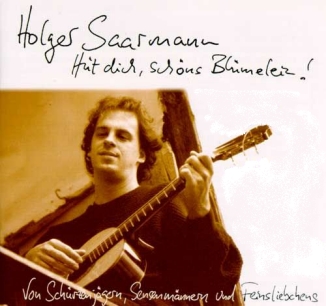Lustig,
lustig ihr lieben Brüder!
Leget alle die Arbeit nieder
und trinkt mit uns ein Gläschen Wein!
Auf die Gesundheit aller Brüder,
die da reißen alles nieder!
Das
soll unsere Freude sein!
Lustig
lebet in Saus und Brause,
weil wir jetzo sind am Schmause!
Arbeit drücket uns nicht viel,
Denn Geld gibt's ja in Hüll und Fülle –
alles zu nehmen ist unser Wille!
Mag's
verwehren, wer da kann!
Weg
mit Meistern und mit Pfaffen!
Kaiser, Könige solln sich raffen!
Weg, wer kommandieren will!
Wir sind alle freie Leute,
alle Welt gehört uns als Beute –
Also
ist es gut und recht!
Schlagt
die Fässer ein, lasst's laufen!
Jetzo heißt es tapfer saufen,
Solches Himmelreich ist nah!
Denn unser Handwerk, das ist verdorben!
Die besten Saufbrüder sind gestorben,
Es
lebet keiner mehr als ich und du.
(Trad./
T: 1871)
Song for the Paris Commune
Merry,
merry, dear brothers!
Let's all lay down work
and drink a glass of wine instead!
To the health of all brothers
that are now tearing down everything:
This
shall be our delight!
Let's
merrily revel and riot!
Now we live on the fat of the land,
with not much work oppressing us.
There is money in abundance,
and we want to take it all.
Try
to stop us if you can!
Away
with masters, priests,
emperors and kings!
Away with all those who wish to command!
We are all free men,
with the whole world being our booty.
That's
the way it should be!
Break
the casks and let it flow!
Now's the time for brave soaking.
This kind of Heaven is near!
Because our craft is ruined.
The best soak brothers have died.
No
one's living except for you and me.
(Trad./
words: 1871)
CD "Hüt
dich, schöns Blümelein!"

Die
"Pariser Kommune" war ein von der Pariser Bevölkerung gewählter
Gemeinderat, der 1871, nach dem revolutionärem Putsch gegen die
Regierung Louis-Adolphe Thiers' u.a. radikale soziale Reformen
durchsetzen sollte. Er wurde nach zwei Monaten von den Versailler
Truppen unter Thiers' Kommando (mit Bismarcks militärischer Unterstützung)
blutig niedergeschlagen. Auf Seite der Communarden gab es fast 30'000
Tote. Dieses (ursprünglich unpolitische) Lied war eine gefährliche
Solidaritätsbekundung deutscher Handwerker mit den Communarden.
Diesen
Text fand ich im Liederbuch des Duos "Zupfgeigenhansel", Thomas Friz & Erich Schmeckenbecher: Es
wollt ein Bauer früh aufstehn (Dortmund 1980). Die letzten
beiden Zeilen ("Denn unser Handwerk, das ist verdorben ...") habe ich
der unpolitischen Version entnommen. Eine schöne Aufnahme der Handwerker-Fassung hat
das Trio "Liederjan" auf ihrer Platte "Mädchen,
Meister, Mönche" (1978) veröffentlicht.
Das
weltweit bekannteste Relikt jener Pariser Revolte ist "Die
Internationale", eigentlich
ein sechsstrophiges Gedicht des Franzosen Eugène Pottier. Er schrieb
es im Juni 1871, gleich nach der Niederschlagung der Pariser Kommune.
In der der Vertonung des Drechslers Pierre Degeyter (ca. 1890) ging es
als Hymne der kommunistischen Idee um die Welt und war
–
bis 1943
–
die erste Nationalhymne der UdSSR.
Weiter
unten folgt "Die Internationale" in drei
Sprachen. Es
scheint als seien
–
für den Gebrauch als Lied
–
nur die ersten drei
Strophen aus dem Französischen übersetzt worden.
The
"Paris Commune" was the first "commun"-ist regime
in history. It was established after the revolutionary putsch against
the government of Louis-Adolphe Thier in 1871, to enforce the
necessary radical social reforms. After only two months, the Commune
was sanguinary crushed by Thiers and the troups of Versaille,
reinforced by Bismarck and the Prussian army. Nearly 30'000 communards
were killed.
This
song, originally a non-political song about artisans on the tramp, was
a dangerous manifestation of solidarity of German workmen with the
communards.
I
found these lyrics in the song book by the duo "Zupfgeigenhansel",
Thomas
Friz & Erich Schmeckenbecher: Es
wollt ein Bauer früh aufstehn (Dortmund 1980). The last two lines ("Denn unser Handwerk, das ist verdorben ...") are added from the
original (?) craftmen's lyrics. A fine
recording of that version was released by the trio
"Liederjan" on their album "Mädchen,
Meister, Mönche" (1978).
The
best-known relict of that Paris revolt is "The Internationale", originally a six stanza poem by the
French Eugène Pottier. He wrote it in June 1871, immediately after
the Commune was crushed. Set to music by the turner Pierre Degeyter
(ca. 1890), it went around the world as the Communist Hymn, being
–
until 1943
–
the first Anthem of the
USSR.
Here's
"The Internationale" in three versions. It seems that –
for the use as a song
–
only the first three stanzas were translated
from French.